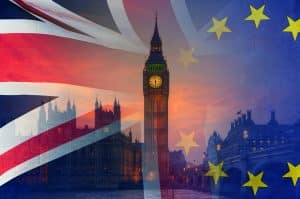UK Won’t ‘Move On’ After Brexit: It Will Move Forward
 Many of the existential issues that have driven a period of prolonged introversion in the UK, hampering its international engagement, have now been laid to rest.
Many of the existential issues that have driven a period of prolonged introversion in the UK, hampering its international engagement, have now been laid to rest.
Brexit will continue to be the defining prism through which the world views the UK; a fundamental issue of domestic British politics and a key variable in the UK’s future prosperity.
The election mantra of the conservative party — “Get Brexit Done” — resonated with a British public frustrated with indecision and rancorous wrangling. Translating a simple leave/remain referendum into a concrete plan to extricate one of the world’s largest economies from the world’s largest economic bloc was always going to be a tortuous affair. Attempting to chart such a difficult course without a parliamentary majority was a recipe for national psychodrama.
Popular exasperation became so great that Prime Minister Boris Johnson’s assurances of forward motion won enough votes from remainers and Labour supporters to revolutionise electoral arithmetic and secure the largest Conservative majority since 1987.
“So what will this new era mean for British politics and Britain’s place in the world?”
So what will this new era mean for British politics and Britain’s place in the world? Will it prove to be the cathartic release voters hoped for, with Britain finally able to move forward? Or will it simply change old problems for new ones as it enters the next Brexit phase?
That substantial Conservative majority has blocked any parliamentary avenue for revoking the decision to leave the EU. The scale of the victory also settled the question in terms of popular debate. The election allowed the UK to overcome a key stage in the Brexit process and permit the Withdrawal Agreement to pass the parliamentary hurdles. It will also probably define the terms of the UK’s exit from the European Union.
That said, the European Commission President Ursula von der Leyen is suggesting that an extension to the transition agreement may be needed mid-year to complete a comprehensive trade deal, and work out agreements about a series of other issues by year-end. This could mean speculation of “No Deal” is back on the table.
The UK will benefit from political stability and a solid parliamentary majority beyond the January 31 withdrawal bill deadline. While moves to dispense or amend the fixed five-year term provision are expected, a general election during the upcoming five-year term is unlikely. The UK’s strength is in its diversity, and this will power an advance on the world stage.
This should not detract from the need for government to address the fundamental challenges of uniting the country after the divisive Brexit experience, and to tackle the vital internal decisions and social discords that have been allowed to accumulate. Looking outward will help heal the internal divisions.
The significance of this stage of the process should not be underestimated. It will frame the next stage and mark a fundamental shift in the nature of the debate. The trading relationship between the UK and the EU is still to be negotiated, and will be the most consequential stage for business and the UK’s global trade relations.
“The trading relationship between the UK and the EU is still to be negotiated, and will be the most consequential stage for business and the UK’s global trade relations.”
While this stage will not be mired in the same parliamentary paralysis that has dogged the process thus far, there is still enough uncertainty over the outcome of the upcoming negotiations to hamper business and investment decisions.
Johnson has signalled his intention to conduct a major review and restructure of key government departments. In one example of international consequence, he has articulated his long-held view that the separation of the Department for International Development from the Foreign and Commonwealth Office in 1997 was a “colossal mistake”. He now appears intent on merging the two departments.
The rationale for the merger is to maximise the value of overseas engagement by creating more natural cross-programme synergies and reducing bureaucratic inefficiencies. The operational challenge of such an ambitious move could lead to disruption for UK policymakers and front-line civil servants. It is to be hoped that disruption will be short-term, but it has the potential to be significant. The UK’s aid budget and diplomatic network are among the world’s largest.
The Department for International trade is set to play a central role in international relations and domestic politics as policy setting moves from Brussels to London. Trade policy will involve compromises, and provide fertile ground for political mischief-makers who seek new ways to criticise the implementation of Brexit. The politics and policy of trade are likely to collide in coming years.
But should it transpire that exiting the EU is bumpier than anticipated, we have been informed that that the UK would be welcomed back into the fold.
By Lord Waverley
You may have an interest in also reading…
Elif Shafak: Exposing the Moralising Slappers
Born in 1971 to a diplomat mother and philosopher father, Elif Shafak was destined for intellectual greatness. She did not
European Council’s Van Rompey: Europe Must Overcome Crisis to Defend Democratic Values
European Council President Herman Van Rompuy’s speech “Europe on the World Stage” recently given in London emphasized the complete change
Scottish Institution Leads with Gusto, by Example
Colleague-friendly, compassionate, and with wholesome social goals in mind, Scottish Friendly is going strong… Scottish Friendly is an institution dedicated















































































